Abstract
The effect of corticosterone treatment on the sensitivity of muscle protein synthesis to insulin infusion was assessed in post-absorptive young rats. To select the optimal time period for corticosterone treatment, protein synthesis was measured by injection of L-[2,6-3H]phenylalanine (1.5 mmol/kg body weight) 1, 4, 12 or 24 h after injection of corticosterone (5 mg/kg body wt.). Muscle protein synthesis was significantly decreased at 4 h and the effect was maximal by 12 h; liver protein synthesis was elevated at 12 h and 24 h. The dose-response of muscle protein synthesis to a 30 min infusion with 0-150 munits of insulin/h was then compared in rats pretreated with corticosterone (10 mg/100 g body wt.) or vehicle alone. When no insulin was infused, corticosterone inhibited protein synthesis in gastrocnemius muscle. High doses of insulin stimulated protein synthesis, but the inhibition by corticosterone was similar to that in the absence of insulin. At intermediate doses of insulin there was an increased requirement for insulin to elicit an equivalent response in muscle protein synthesis. Plantaris muscle responded in a manner similar to that of gastrocnemius, but neither soleus muscle nor liver responded significantly to insulin. These data suggest that corticosterone has two modes of action; one which is independent from and opposite to that of insulin, and a second which causes insulin-resistance through a decrease in sensitivity rather than a change in responsiveness.
Full text
PDF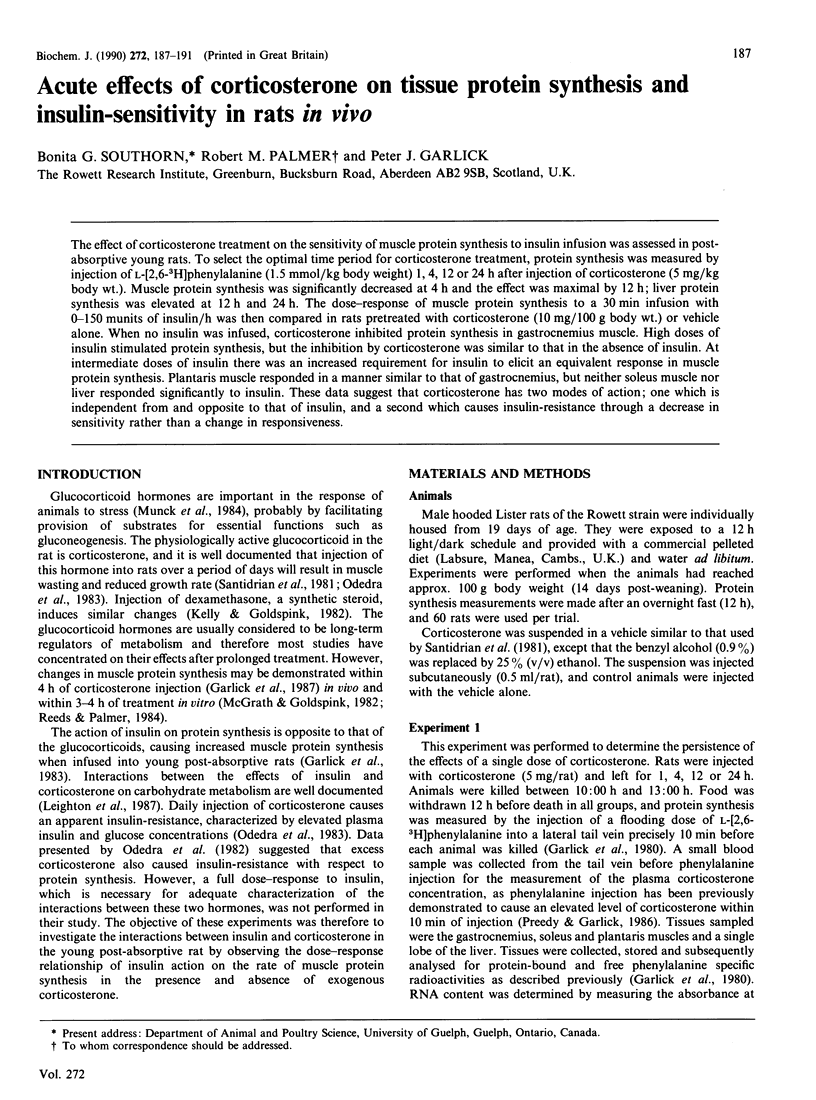
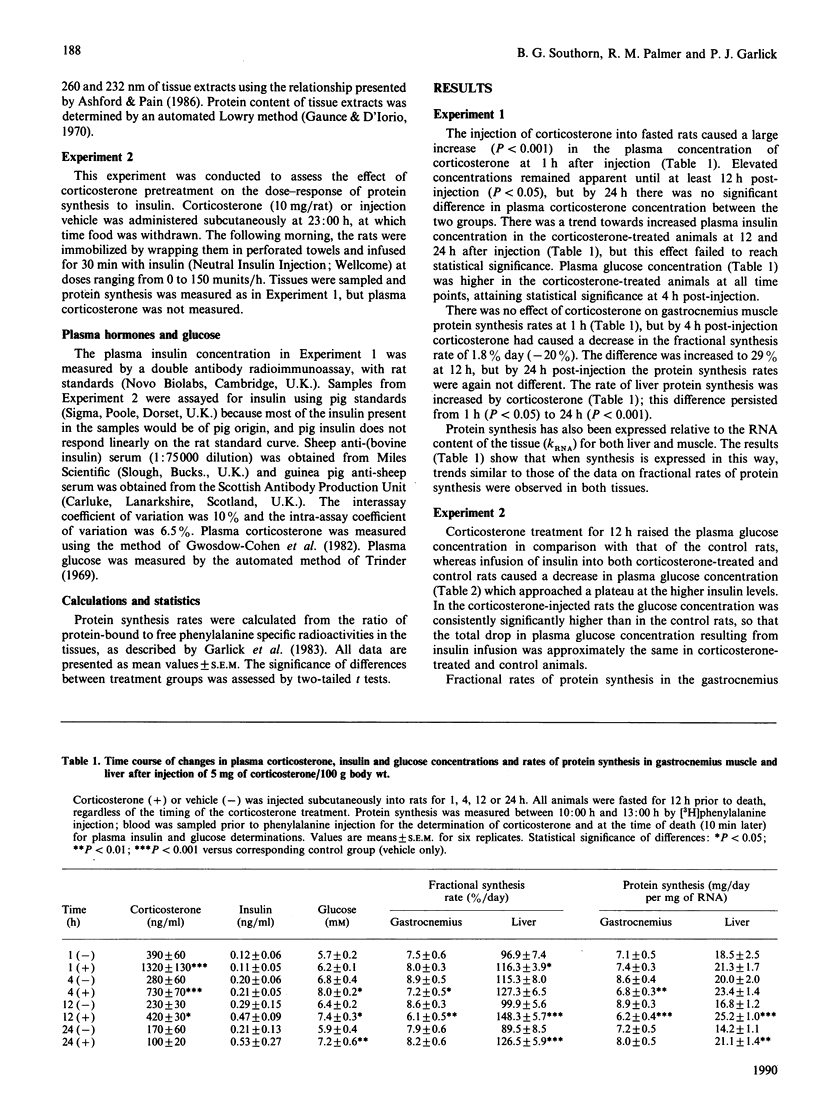
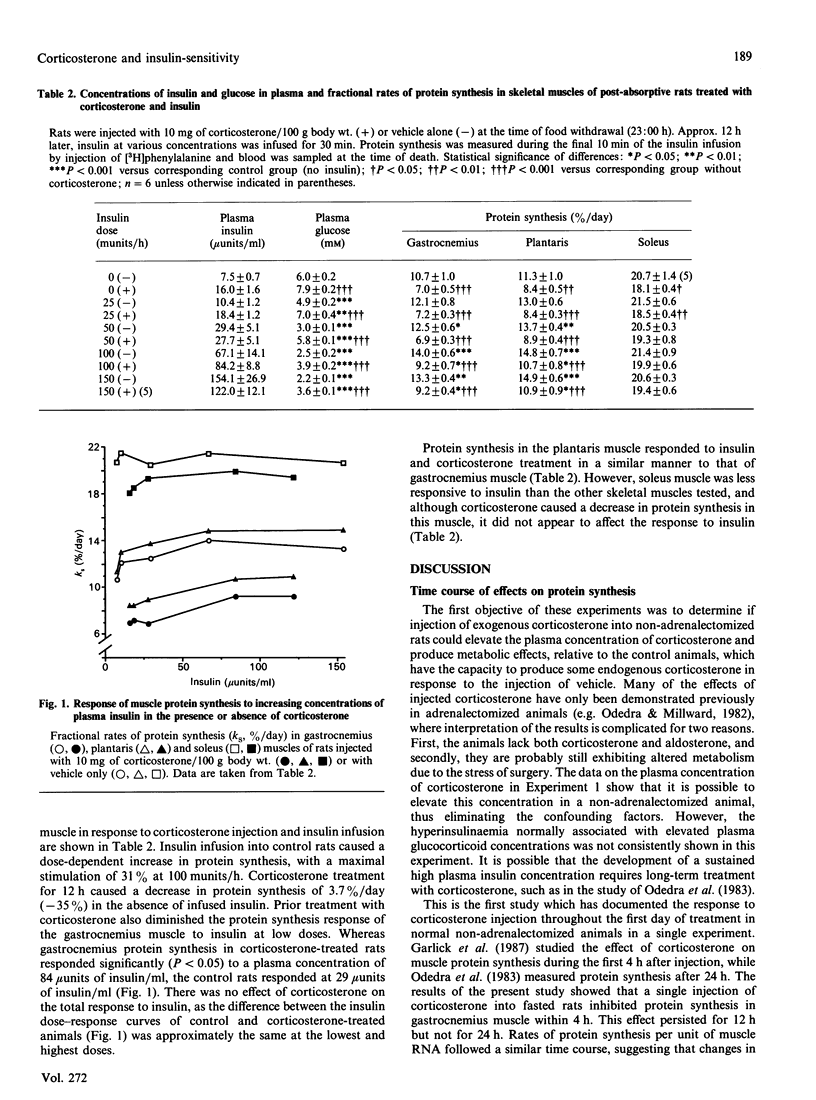
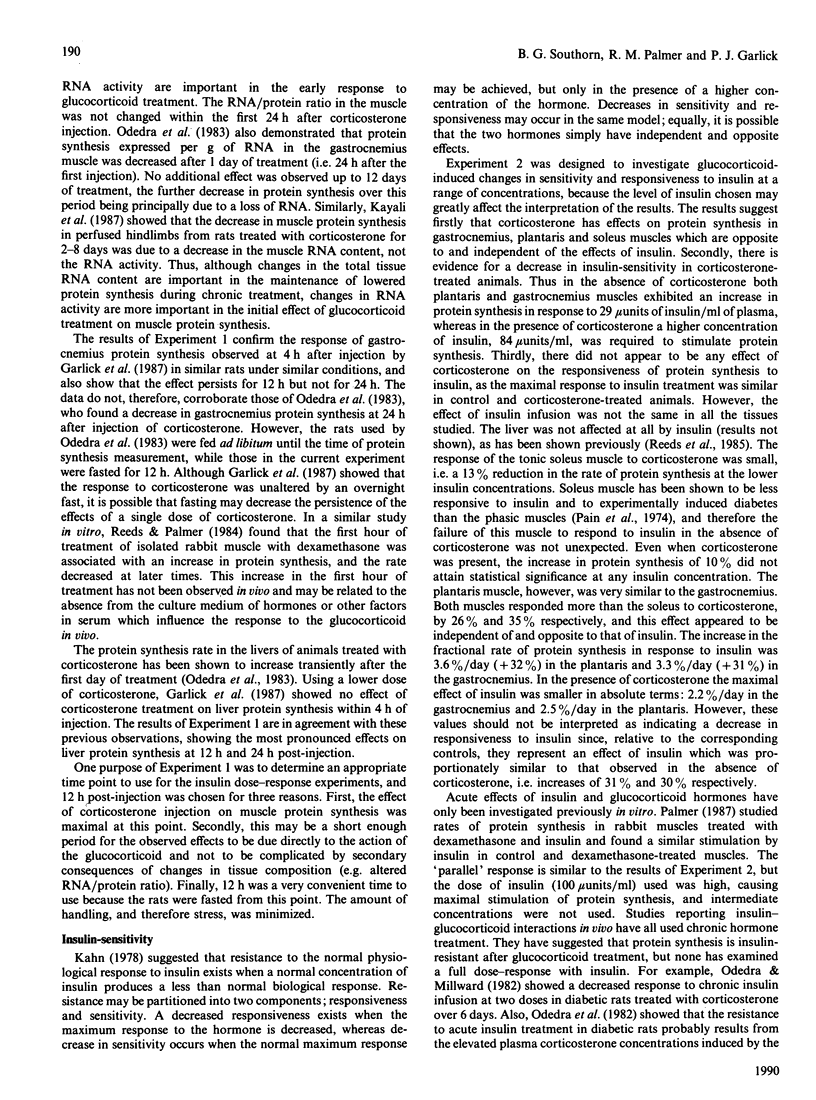
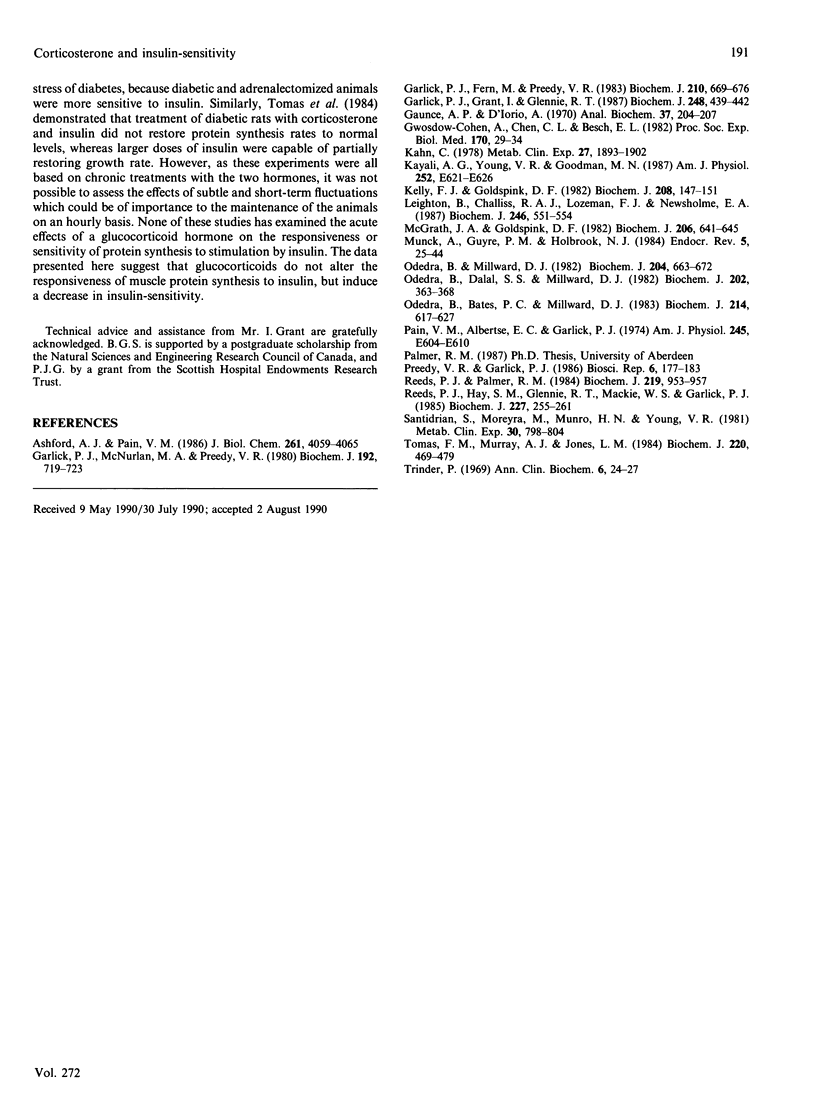
Selected References
These references are in PubMed. This may not be the complete list of references from this article.
- Ashford A. J., Pain V. M. Effect of diabetes on the rates of synthesis and degradation of ribosomes in rat muscle and liver in vivo. J Biol Chem. 1986 Mar 25;261(9):4059–4065. [PubMed] [Google Scholar]
- Garlick P. J., Fern M., Preedy V. R. The effect of insulin infusion and food intake on muscle protein synthesis in postabsorptive rats. Biochem J. 1983 Mar 15;210(3):669–676. doi: 10.1042/bj2100669. [DOI] [PMC free article] [PubMed] [Google Scholar]
- Garlick P. J., Grant I., Glennie R. T. Short-term effects of corticosterone treatment on muscle protein synthesis in relation to the response to feeding. Biochem J. 1987 Dec 1;248(2):439–442. doi: 10.1042/bj2480439. [DOI] [PMC free article] [PubMed] [Google Scholar]
- Garlick P. J., McNurlan M. A., Preedy V. R. A rapid and convenient technique for measuring the rate of protein synthesis in tissues by injection of [3H]phenylalanine. Biochem J. 1980 Nov 15;192(2):719–723. doi: 10.1042/bj1920719. [DOI] [PMC free article] [PubMed] [Google Scholar]
- Gaunce A. P., D'Iorio A. Microdetermination of protein by an automated Lowry method. Anal Biochem. 1970 Sep;37(1):204–207. doi: 10.1016/0003-2697(70)90282-4. [DOI] [PubMed] [Google Scholar]
- Gwosdow-Cohen A., Chen C. L., Besch E. L. Radioimmunoassay (RIA) of serum corticosterone in rats. Proc Soc Exp Biol Med. 1982 May;170(1):29–34. doi: 10.3181/00379727-170-41391. [DOI] [PubMed] [Google Scholar]
- Kahn C. R. Insulin resistance, insulin insensitivity, and insulin unresponsiveness: a necessary distinction. Metabolism. 1978 Dec;27(12 Suppl 2):1893–1902. doi: 10.1016/s0026-0495(78)80007-9. [DOI] [PubMed] [Google Scholar]
- Kayali A. G., Young V. R., Goodman M. N. Sensitivity of myofibrillar proteins to glucocorticoid-induced muscle proteolysis. Am J Physiol. 1987 May;252(5 Pt 1):E621–E626. doi: 10.1152/ajpendo.1987.252.5.E621. [DOI] [PubMed] [Google Scholar]
- Kelly F. J., Goldspink D. F. The differing responses of four muscle types to dexamethasone treatment in the rat. Biochem J. 1982 Oct 15;208(1):147–151. doi: 10.1042/bj2080147. [DOI] [PMC free article] [PubMed] [Google Scholar]
- Leighton B., Challiss R. A., Lozeman F. J., Newsholme E. A. Effects of dexamethasone treatment on insulin-stimulated rates of glycolysis and glycogen synthesis in isolated incubated skeletal muscles of the rat. Biochem J. 1987 Sep 1;246(2):551–554. doi: 10.1042/bj2460551. [DOI] [PMC free article] [PubMed] [Google Scholar]
- McGrath J. A., Goldspink D. F. Glucocorticoid action on protein synthesis and protein breakdown in isolated skeletal muscles. Biochem J. 1982 Sep 15;206(3):641–645. doi: 10.1042/bj2060641. [DOI] [PMC free article] [PubMed] [Google Scholar]
- Munck A., Guyre P. M., Holbrook N. J. Physiological functions of glucocorticoids in stress and their relation to pharmacological actions. Endocr Rev. 1984 Winter;5(1):25–44. doi: 10.1210/edrv-5-1-25. [DOI] [PubMed] [Google Scholar]
- Odedra B. R., Bates P. C., Millward D. J. Time course of the effect of catabolic doses of corticosterone on protein turnover in rat skeletal muscle and liver. Biochem J. 1983 Aug 15;214(2):617–627. doi: 10.1042/bj2140617. [DOI] [PMC free article] [PubMed] [Google Scholar]
- Odedra B. R., Dalal S. S., Millward D. J. Muscle protein synthesis in the streptozotocin-diabetic rat. A possible role for corticosterone in the insensitivity to insulin infusion in vivo. Biochem J. 1982 Feb 15;202(2):363–368. doi: 10.1042/bj2020363. [DOI] [PMC free article] [PubMed] [Google Scholar]
- Odedra B. R., Millward D. J. Effect of corticosterone treatment on muscle protein turnover in adrenalectomized rats and diabetic rats maintained on insulin. Biochem J. 1982 Jun 15;204(3):663–672. doi: 10.1042/bj2040663. [DOI] [PMC free article] [PubMed] [Google Scholar]
- Pain V. M., Albertse E. C., Garlick P. J. Protein metabolism in skeletal muscle, diaphragm, and heart of diabetic rats. Am J Physiol. 1983 Dec;245(6):E604–E610. doi: 10.1152/ajpendo.1983.245.6.E604. [DOI] [PubMed] [Google Scholar]
- Preedy V. R., Garlick P. J. The response of muscle protein synthesis to nutrient intake in postabsorptive rats: the role of insulin and amino acids. Biosci Rep. 1986 Feb;6(2):177–183. doi: 10.1007/BF01115004. [DOI] [PubMed] [Google Scholar]
- Reeds P. J., Hay S. M., Glennie R. T., Mackie W. S., Garlick P. J. The effect of indomethacin on the stimulation of protein synthesis by insulin in young post-absorptive rats. Biochem J. 1985 Apr 1;227(1):255–261. doi: 10.1042/bj2270255. [DOI] [PMC free article] [PubMed] [Google Scholar]
- Reeds P. J., Palmer R. M. Changes in prostaglandin release associated with inhibition of muscle protein synthesis by dexamethasone. Biochem J. 1984 May 1;219(3):953–957. doi: 10.1042/bj2190953. [DOI] [PMC free article] [PubMed] [Google Scholar]
- Santidrian S., Moreyra M., Munro H. N., Young V. R. Effect of corticosterone and its route of administration on muscle protein breakdown, measured in vivo by urinary excretion of N tau-methylhistidine in rats: response to different levels of dietary protein and energy. Metabolism. 1981 Aug;30(8):798–804. doi: 10.1016/0026-0495(81)90026-3. [DOI] [PubMed] [Google Scholar]
- Tomas F. M., Murray A. J., Jones L. M. Interactive effects of insulin and corticosterone on myofibrillar protein turnover in rats as determined by N tau-methylhistidine excretion. Biochem J. 1984 Jun 1;220(2):469–479. doi: 10.1042/bj2200469. [DOI] [PMC free article] [PubMed] [Google Scholar]


